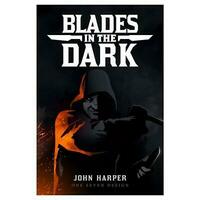You need to sign in or sign up before continuing.
Take a photo of a barcode or cover
Solid system design which will do heist roleplaying very well for groups who prefer to jump into the action rather than spending a long time planning. For groups for whom the pre-planning is a big chunk of the fun, on the other hand, the game's conceits will actively sabotage that. Full review: https://refereeingandreflection.wordpress.com/2020/03/24/kickstopper-blades-in-the-dark/
This kickstarter role playing game has two aspects - setting and rules. Both are interesting, and both a major change from something like D&D.
I really like both the simplicity and flexibility of the rules, and they are clearly explained in this book. The narrative concept of diving into the action will make for a faster game. Using flashbacks instead of extensive planning will make for really interesting heists - a genre I love to read and watch. I won't go into full game details in a book review, but this uses six sided dice, the rulebook and some printed materials, and 3x5 cards for the various notes and clocks.
The setting is the other half of the story, and the author has created a really interesting framework for all the various factions and heists. I can truly see why various home games will differ pretty wildly from each other, which is not a bad thing. What is a bit tough for me is just how disconnected this is from other settings. There is magic, electricity, ghosts and ultra powerful other beings. The main setting is isolated from the external world by a lightning wall - but there's a rail which leaves this and travels to other locations. I know players who will want to know more, and characters who (having lived here) will need to know more. This is a lot of lifting into a new setting.
What would have helped me is fiction. Stories written in this world that would give a hint to what goes on, without locking everything down. A few have been published by [a:Andrew Shields|333790|Andrew Shields|https://s.gr-assets.com/assets/nophoto/user/u_50x66-632230dc9882b4352d753eedf9396530.png]. There is also a pretty good list of influences, and I suppose a game could be adapted to match one of those directly. Related settings have been published under the imprint "Forged in the Dark".
It's a lot to take in, but I am looking forward to running a game with the right group.
I really like both the simplicity and flexibility of the rules, and they are clearly explained in this book. The narrative concept of diving into the action will make for a faster game. Using flashbacks instead of extensive planning will make for really interesting heists - a genre I love to read and watch. I won't go into full game details in a book review, but this uses six sided dice, the rulebook and some printed materials, and 3x5 cards for the various notes and clocks.
The setting is the other half of the story, and the author has created a really interesting framework for all the various factions and heists. I can truly see why various home games will differ pretty wildly from each other, which is not a bad thing. What is a bit tough for me is just how disconnected this is from other settings. There is magic, electricity, ghosts and ultra powerful other beings. The main setting is isolated from the external world by a lightning wall - but there's a rail which leaves this and travels to other locations. I know players who will want to know more, and characters who (having lived here) will need to know more. This is a lot of lifting into a new setting.
What would have helped me is fiction. Stories written in this world that would give a hint to what goes on, without locking everything down. A few have been published by [a:Andrew Shields|333790|Andrew Shields|https://s.gr-assets.com/assets/nophoto/user/u_50x66-632230dc9882b4352d753eedf9396530.png]. There is also a pretty good list of influences, and I suppose a game could be adapted to match one of those directly. Related settings have been published under the imprint "Forged in the Dark".
It's a lot to take in, but I am looking forward to running a game with the right group.
adventurous
challenging
dark
informative
inspiring
mysterious
medium-paced
Seems like fun mechanics and world, now time to make something within it.
This is easily my favorite RPG to date. The world building is 1800's, dystopian fantasy and the book goes into great detail to explain the lore and politics of current day Duskvol, providing GMs with a lot of material to construct a campaign. The gaming mechanics seem confusing at first but quickly become easy and understandable. Honestly I prefer this over DnD and Pathfinder. It's a wonderful, fun table top experience
Blades in the Dark, by John Harper and Evil Hat Productions
I am hesitant to call any game perfect, because even when it feels like it in the moment, time marches on and people innovate in Waze that we cannot imagine until we see them, but for me at least, Blades in the Dark feels as close to perfect as you’re going to get. A simple but robust rule set emphasizes a narrative focused game experience, One that manages to avoid most of the heavily time intensive aspects of most tabletop RPGs. You’re never going to spend an entire session planning, or 20 minutes arguing and debating over the interpretation of a rule, instead blades in the dark lets you jump right into the RP and action, and wonder of all wonders, you can even finish an adventure in a single session, with the right groups, even two or three.
Set in a haunted industrial fantasy world, you take on the roles of members of a criminal gang, your goal is to rise in power and gain territory in a city where there is little difference between the criminal gangs and the “legitimate” authorities. How you do this is largely up to you, you can be thugs, con artists, thieves, mercenaries, occultists, assassins, or any number of other options, each one with some surprisingly entertaining options. Your choice of gang style will effect your game nearly as much as your choice of character, but don’t worry if your group decides that they aren’t loving the type of gang they are at some point, because you can always change it and even if they don’t, there’s nothing saying that thieves can’t do a little contract killing on the side.
I don’t want to talk about the rules for Blades in the Dark in to much depth, because for the table top initiated I couldn’t possibly tell you enough and for the uninitiated what I could tell you wouldn’t be enough to make you really understand. What I can say of it is that, it is simple enough for a beginner to jump in quickly but deep enough that the experienced table top player can find a lot there to keep them interested. Though, if they aren’t fans of the Apocalypse Engine, they probably won’t be fans here either, as Blades does use a heavily modified version of the Apocalypse Engine.
I do want to talk about two aspects of the rules though, aspects that I found absolutely delightful, The first is the ability to make a devils bargain with your game master, basically if the dice don’t go the way you want, you can give yourself a bonus to them by negotiating with the GM to determine how the seam is altered to negatively impact your character or the group, if you can both agree, you get your bonus and succeed at your action but the situation just got a little bit worse. The other one is a system that allows you to flashback to earlier points, remember when I said that blades in the dark allowed you to avoid spending an entire session planning? Well this is how they do that, instead of spending all your time arguing and debating and planning about things like, “what if there are guards?” or “what if there are alarms?” when you encounter these things you have the option to flashback to an earlier time when you found the guard at his favorite drinking establishment and just bribed him to look the other way or something like that, then you roll some dice to see how successful your attempt was and we are back in the present to see the results. These two rules are a delight at the table and allow games to unfold in ways that neither The player or the GM could possibly have anticipated.
So far I’ve run blades in the dark for a couple of one shots, and I am about to start a Full campaign in the next week, so it is still early on, but I could easily see Blades in the Dark becoming my favorite RPG and the one I use to initiate new players to the hobby.
I would recommend Blades in the Dark to anyone who prefers their games to lean to the narrative side and not get bogged down with planning and rules, anyone who enjoyed the Gentleman Bastards series by Scott Lynch, and anyone who loved Breaking Bad, but wished it had a few more ghosts in it.
Five out of five stars.
I am hesitant to call any game perfect, because even when it feels like it in the moment, time marches on and people innovate in Waze that we cannot imagine until we see them, but for me at least, Blades in the Dark feels as close to perfect as you’re going to get. A simple but robust rule set emphasizes a narrative focused game experience, One that manages to avoid most of the heavily time intensive aspects of most tabletop RPGs. You’re never going to spend an entire session planning, or 20 minutes arguing and debating over the interpretation of a rule, instead blades in the dark lets you jump right into the RP and action, and wonder of all wonders, you can even finish an adventure in a single session, with the right groups, even two or three.
Set in a haunted industrial fantasy world, you take on the roles of members of a criminal gang, your goal is to rise in power and gain territory in a city where there is little difference between the criminal gangs and the “legitimate” authorities. How you do this is largely up to you, you can be thugs, con artists, thieves, mercenaries, occultists, assassins, or any number of other options, each one with some surprisingly entertaining options. Your choice of gang style will effect your game nearly as much as your choice of character, but don’t worry if your group decides that they aren’t loving the type of gang they are at some point, because you can always change it and even if they don’t, there’s nothing saying that thieves can’t do a little contract killing on the side.
I don’t want to talk about the rules for Blades in the Dark in to much depth, because for the table top initiated I couldn’t possibly tell you enough and for the uninitiated what I could tell you wouldn’t be enough to make you really understand. What I can say of it is that, it is simple enough for a beginner to jump in quickly but deep enough that the experienced table top player can find a lot there to keep them interested. Though, if they aren’t fans of the Apocalypse Engine, they probably won’t be fans here either, as Blades does use a heavily modified version of the Apocalypse Engine.
I do want to talk about two aspects of the rules though, aspects that I found absolutely delightful, The first is the ability to make a devils bargain with your game master, basically if the dice don’t go the way you want, you can give yourself a bonus to them by negotiating with the GM to determine how the seam is altered to negatively impact your character or the group, if you can both agree, you get your bonus and succeed at your action but the situation just got a little bit worse. The other one is a system that allows you to flashback to earlier points, remember when I said that blades in the dark allowed you to avoid spending an entire session planning? Well this is how they do that, instead of spending all your time arguing and debating and planning about things like, “what if there are guards?” or “what if there are alarms?” when you encounter these things you have the option to flashback to an earlier time when you found the guard at his favorite drinking establishment and just bribed him to look the other way or something like that, then you roll some dice to see how successful your attempt was and we are back in the present to see the results. These two rules are a delight at the table and allow games to unfold in ways that neither The player or the GM could possibly have anticipated.
So far I’ve run blades in the dark for a couple of one shots, and I am about to start a Full campaign in the next week, so it is still early on, but I could easily see Blades in the Dark becoming my favorite RPG and the one I use to initiate new players to the hobby.
I would recommend Blades in the Dark to anyone who prefers their games to lean to the narrative side and not get bogged down with planning and rules, anyone who enjoyed the Gentleman Bastards series by Scott Lynch, and anyone who loved Breaking Bad, but wished it had a few more ghosts in it.
Five out of five stars.
John Harper is a genius. Full stop. I will sing his praises to anyone who will listen (those who won't, too!). Blades in the Dark is agile, quick to prep, and chaotic in the best of ways. Rule systems which mechanically reward roleplaying. I could go on. After playing Blades, 5e D&D feels so, so clunky in so, so many ways.
adventurous
dark
informative
inspiring
mysterious
medium-paced
This RPG sourcebook introduces a creative and simple system with a great flavorful setting for adventures involving street-level criminals in a dark Steampunk world.
I haven't had a chance to bring this to a table yet, but I really enjoyed reading the systems and rules for this game. I really like the avoidance of planning and getting bogged down in that part of the roleplaying experience to just go with the flow and do movie-like flashbacks to move the story forward. Really looking forward to playing this with my D&D group.
I haven't read many RPG sourcebooks cover to cover. I'm happy that this is one of them.
First off, it's a reasonable size for toting around and reading like a normal book while still being a pretty nice physical print product. I managed to grab the hardcover book from my FLGS and the artwork and design treatment reflects the setting and feeling of the game very well. I love my RPG print products, but for the most part even those most beautiful sourcebooks read like giant textbooks or references rather than leisure reading.
Secondly, everything about it (even aforementioned graphic treatment and layout) ooooooozes atmosphere. The game systems are explained fairly straightforwardly and you're given just enough to get the gears of your imagination turning with the possibilities. I was caught imagining a world that was a lot like China Mieville's Bas-Lag, but with the action of Dishonored and the political grandstanding among institutions of The Wire. Which are three fantastic texts to pull from to build a game world.
I haven't had a chance to actually play the game yet, but I really hope to soon, because just reading the dang book was enough to make me write a Goodreads review (which I don't do often!) and imagine characters and scenarios (which makes me want to push it towards other people so I can convince THEM to GM.)
First off, it's a reasonable size for toting around and reading like a normal book while still being a pretty nice physical print product. I managed to grab the hardcover book from my FLGS and the artwork and design treatment reflects the setting and feeling of the game very well. I love my RPG print products, but for the most part even those most beautiful sourcebooks read like giant textbooks or references rather than leisure reading.
Secondly, everything about it (even aforementioned graphic treatment and layout) ooooooozes atmosphere. The game systems are explained fairly straightforwardly and you're given just enough to get the gears of your imagination turning with the possibilities. I was caught imagining a world that was a lot like China Mieville's Bas-Lag, but with the action of Dishonored and the political grandstanding among institutions of The Wire. Which are three fantastic texts to pull from to build a game world.
I haven't had a chance to actually play the game yet, but I really hope to soon, because just reading the dang book was enough to make me write a Goodreads review (which I don't do often!) and imagine characters and scenarios (which makes me want to push it towards other people so I can convince THEM to GM.)




